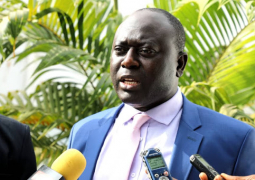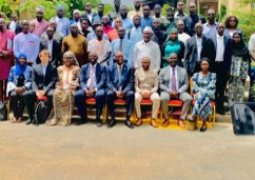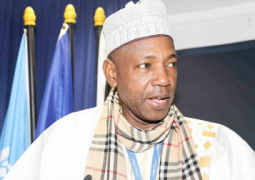
To possibly attain this pursuit, he said, is necessitated by the procurement of 180 tractors.
Minister Sabally revealed this development on Friday night at the Mansa Kunda Ministerial Town Hall Platform held at the Sir Dawda Kairaba Jawara Conference Centre in Bijilo.
He informed that 20 rotavator boats were procured and delivered to farmers in March 2024; 4 tractors procured RRVCDP, 7,979 Ha ploughs countrywide by MoALFS/Projects.
He noted that this includes 340 Mt certified rice seeds, 210 Mt certified maize seeds, 28 tons of groundnut, 140,000 liters of herbicides with 7,000 hectares to be covered and 28,000 tons of fertilizer (578,000 bags), reduction in fertilizer price from 1150/kg to 1100/kg.
Dr. Sabally further mentioned that his ministry’s focus for this year is to increase land size by engaging in land preparation, and yields increase to 4 tons per hectare by utilising high yield climate smart seeds among others.
He said that their focus is also to ensure private sector engagement by expanding SME matching grants and other incentives, to attract youth and women in agriculture by reducing drudgery and increasing mechanisation.
He indicated that the 2024 outlook also seeks to increase market access by working with partners such as MOTRIE and GCCI and others in increasing access to financing by launching GAMIRSAL and working with CBG.
He then highlighted the need for institutional capacity building to strengthen research and development and developing the entire value chain for rice, maize, horticulture, poultry and small ruminants.
Talking about the 2023 priorities, he noted that taking a cue from the national policy and programme documents, and the pronouncement of President Barrow to achieve national self-sufficiency in rice production by 2030, he said that his Ministry set out priorities for the year 2023 by organising the various categories of actors in the sector, for greater coherence, synergy, efficiency and productivity.
He said this includes setting strategic priorities towards a consolidated programme to attain self-sufficiency in rice production by 2030, increasing yield and productivity across various commodities and expanding the role of the private sector in agricultural production and marketing.
He said other previous priority areas include expanding while at the same time deepening their cooperation with their development partners to increase investment in the sector.
These, he added include improving the capacities of smallholder farmers leading to increased contributions to national agricultural production, while increasing their incomes and nutritional status; and ensuring farmers have adequate access to key inputs to enhance productivity, while at the same time ensuring adequate market access for key commodities.
Dr. Sabally further revealed that there have been significant results registered across the country for key commodities, compared to the year 2022.





